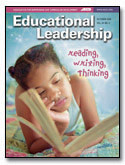The author of “Listen to the Natives” (Dec. 2005/Jan. 2006) responds to e-mail feedback from a reader.
Respect. We all probably think that we have it for our students. And we certainly think that they should have it for us. But do we? Do they? I am increasingly convinced that mutual disrespect lies at the root of many of today's classroom difficulties.
The issue was brought home to me in a personal way. In December 2005, I was privileged to have an article published in Educational Leadership. Titled “Listen to the Natives,” the article presented many new ideas about educating kids in the 21st century.
I received several e-mail responses from readers. Many were positive, but just as many disagreed with some of my points. I certainly don't mind criticism—I write to discuss new ideas and promote new thinking—and I certainly don't expect every reader to agree with me.
But one day an e-mail arrived in my inbox, which I gathered was from a group of school administrators. There was no salutation. “Your sales pitch reminds us of silicon snake oil,” it read. “Sorting data without context fuels ignorance.”
Those two sentences hit me hard. I spent a great deal of time thinking about whether, and how, to respond. Although I generally like responding to critics and enjoy pitting my observations and evidence against theirs, somehow this seemed different.
The Game of Disrespect
Finally it occurred to me why this was different. The response of these so-called “educators” disrespected me (“your sales pitch”), disrespected my ideas (“silicon snake oil,” “data without context”), and ultimately disrespected all the 21st-century students about whom I was writing.
For the first time, I began to see just how much disrespect goes on between the generations, both in our classrooms and in our homes. If you ask most teachers (or parents), they'll probably swear up and down that theydo respect their kids. But what do they say to them? One high school student reported to me that his parents told him, “Your computer games are a total waste of your time, money, and brain cells.” Given that this student spends a lot of time playing these games, which are often more challenging than his schoolwork, and that he is proud of succeeding at them, this comment reflects enormous disrespect. The kid was pretty hurt by it.
But what goes around comes around. We all know that parents and teachers are not fluent with today's digital technology, whereas kids master it easily. Digital technology may well be the literacy of the 21st century, and by that standard, most of today's teachers are illiterate. That's certainly how many students see their teachers—and they disrespect them for it. “Don't even try to keep up with technology,” said a middle school girl recently to a group of teachers. “You'll only look stupid.”
Amazingly, even parents and teachers get in on the disrespect game. “The cookies on my daughter's computer know more about her interests than her teachers do,” quipped a well-known scientist recently. It's funny, yes, and has a grain of truth. But it's also disrespectful. And if we could hear the discussions taking place daily in teachers lounges, how much disrespect for students—and parents—might we find there? Having been there, I can tell you. Plenty.
Learners and Teachers
With such an atmosphere of mutual disrespect festering in our classrooms, learning is becoming increasingly difficult. Before you can teach or learn from someone, you need to genuinely respect them.
So how do we inject mutual respect—rather than mutual disrespect—into our classrooms? We must foster the important message that each of us, whether adult or kid, teacher or student, is every day a learner in some areas and a teacher in others.
Adults must accept that our kids have a lot to teach us, not only about technology, but also about 21st-century life in general, and that we can and should learn from them every day. Kids need to understand, particularly in light of today's rapid technological advances, that their teachers have important lessons to teach about technology—such as the meaning of research and of truth in an era rife with data and technical manipulation.
Until we all “get it,” I propose that we post in large letters in all of our classrooms—and above our bathroom mirrors, if need be—the following message:
We Are All Learners.
We Are All Teachers.
We should not only post this slogan, but also reflect on it every day—alone and with our students—and contemplate its many meanings for what we are all struggling to do.
